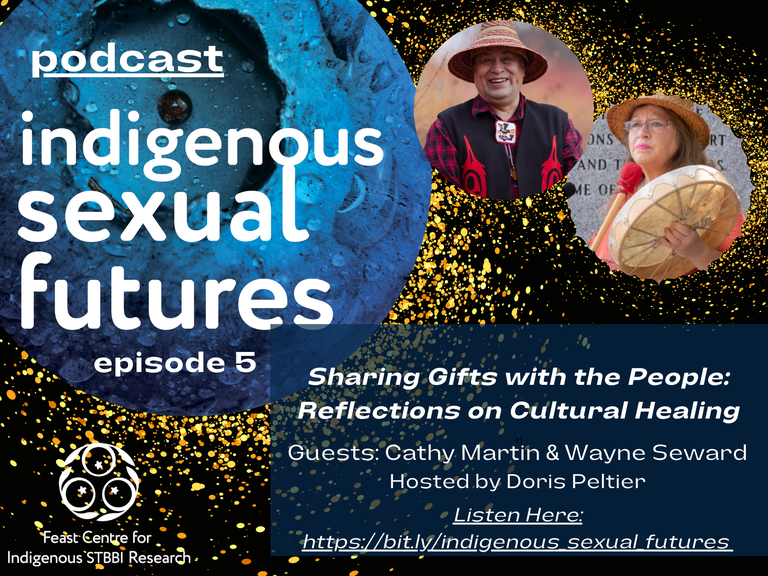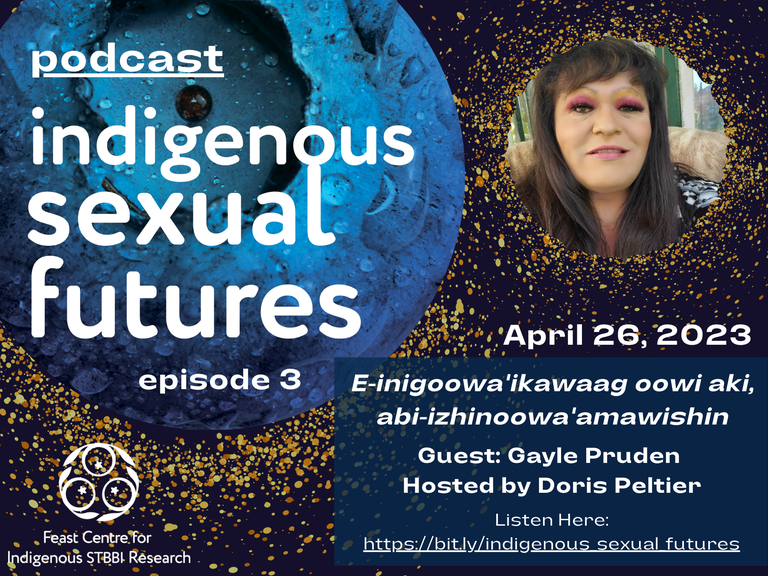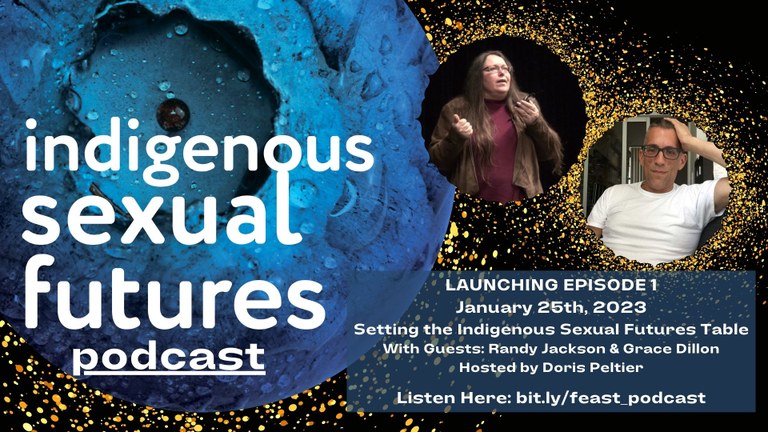Indigenous Sexual Futures
Imagine talking about sexuality like we talk about food! It’s time to bring conversations of healthy sexuality to the kitchen table and be the future that our ancestors envisioned. It’s not just about sex; it is about the expansiveness of sexuality that encompass our understanding of the world, our relationships to land and water, and solving health issues that affect our communities. Indigenous Sexual Futures are stories of hope, truth, reclamation, strength, survivance and thrivance.
Join Us at the Feast Centre Table
Developed by the Feast Centre for Indigenous STBBI Research, Indigenous Sexual Futures is a monthly, 45-minute storytelling session with a diverse array of community members, Elders, and scholars. Guests of the podcast will speak about sexuality, STBBIs, sovereignty of our bodies, pleasure, Indigenous understandings of gender, and much more.
Indigenous Sexual Futures is a podcast produced by the Feast Centre for Indigenous STBBI Research that features a diverse group of Knowledge holders/guests to speak about sexuality, STBBIs, sovereignty over our bodies, pleasure, Indigenous understanding of gender, Indigenous science and much more; this podcast will springboard off many ideas, including scholarly writings on futurisms, survivance and thrivance. Indigenous sexual futures is about imagining a new future and building on the strengths of Indigenous knowledges on sexuality.
Let’s feast while we imagine a new future that builds on the strength of Indigenous Knowledges on sexuality and embraces wholeness and health in our communities.
Listen Here!
Hosted by Doris Peltier
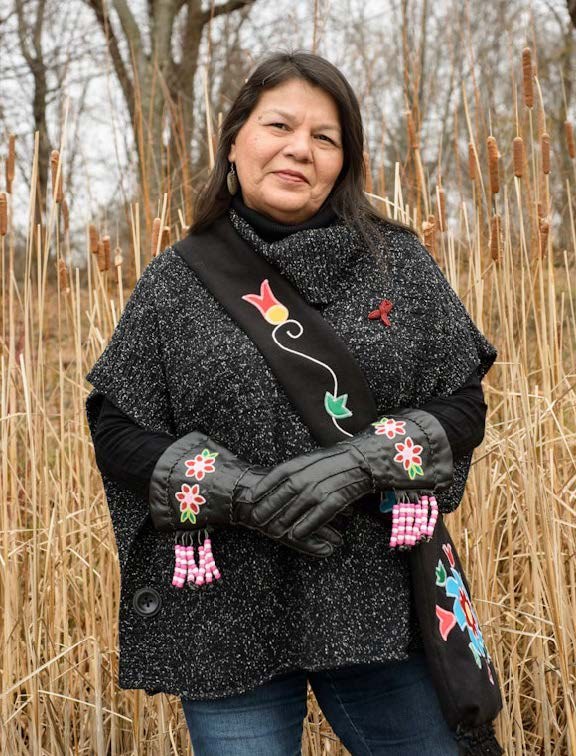
Episode 9: Assessing Syphilis Rapid Testing in Inner-City Winnipeg using Indigenous Approaches
In Episode 9, Doris invites Melissa Morris, 2-Spirit/Indigiqueer Community-based researcher, along with Dr. John Schellenberg, Assistant Professor in Medical Microbiology and Infectious Diseases at UofM to the table to talk about their research on assessing Syphilis rapid-testing diagnostic needs in community. Doris asked them to talk about their research approach in terms of how they combined basic science methods with Indigenous methods in their research. How do you deliver a project titled, Needs assessment for STBBI screening and other diagnostic services in Indigenous and non-Indigenous community settings: Experiences, preferences, and deal-breakers to community for it to be palatable and understood was the starting question, and off they went to tell the story of their research. A key point that John underscored was that quite often in research, Knowledge Translation is often relegated to the end when he believes that it should be at the front of your research, particularly in basic science. This episode also commemorates World AIDS Day 2024 and Indigenous AIDS Awareness week and highlights the tremendous gains in both scientific and Indigenous HIV research. Exciting!!! We hope that you will enjoy this episode.
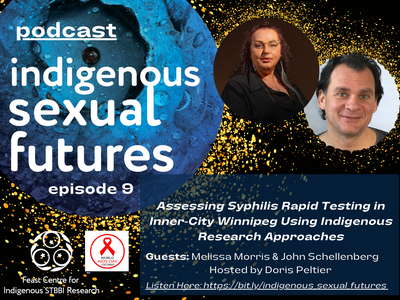
Episode 8: Indigiqueer Futures with Joshua Whitehead
In Episode 8, Doris invites Joshua Whitehead, Oji-Cree/nehiyaw, Two-Spirit/Indigiqueer member of Peguis First Nation (Treaty 1) to the table to share what underpins his writings and their connections to Indigenous Futurisms. While studying at the University of Winnipeg as a youth and beginning to contemplate writing, he recalls how very little representation there was of two-spirit characters in books and wanted youth to see themselves depicted, “I wanted Indigenous readers, specifically Indigenous youth to see themselves represented”, and says that they were not being fully represented in that contemporary/urban way. He pays homage to what he calls the first wave of Indigenous authors and positions himself as part of a second wave of Indigenous authors. He says he was drawn into the romance of language but wanted to write about the grit rather than write about romanticizing the land which he inadvertently did do with his book, a memoir titled, Making Love with the Land. What he really wanted to write about was “the healthy, powerful and sometimes hurtful beautiful queer Indigenous relationships.” He also unpacks the usage of the term Indigiqueer and acknowledges the youth legacy that underpins what we are currently seeing with Indigiqueer/Two-Spirit Indigenous youth who are blazing a trail forward to the future. Joshua Whitehead is Assistant Professor at the University of Calgary and is housed in the departments of English and International Indigenous Studies.
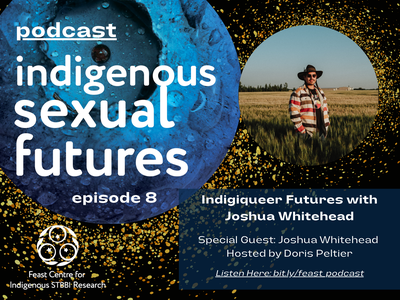
Episode 7: Saanginiiniq Qalunaanimiutauluni
In Episode 7, Doris invites Inuk Elder Naulaq LeDrew to the table in an episode titled Saanginiiniq Qalunaanimiutauluni. In Inuktituut, the title translates to ‘being strong in the urban setting’, which speaks to how she maintains her Inuit way of knowing and being despite having lived away from her homeland for many years. Naulaq is an artist and an avid storyteller and shares about her upbringing and her deep connection to the land and to her Inuit culture. From stories about the importance of food gathering on the land as part of survival to sharing about how throat singing reflects the sounds of the land, animals and water, but more importantly, she tells us that throat singing was for the babies who were carried in the amautis that Inuit women wear to carry their babies. She finishes with the powerful story of Sedna and highlights why these stories were told.
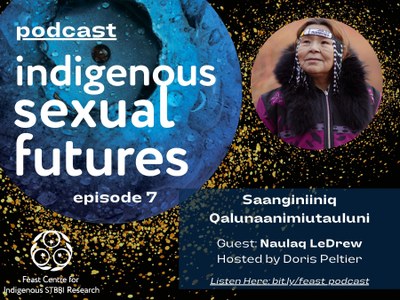
Episode 6: A Love Letter to Our Aunties and Kokoms
In this special WORLD AIDS Day episode, Indigenous Sexual Futures puts a spotlight on Ka Ni Kanichihk Inc., a remarkable Indigenous community-based organization in Winnipeg, Manitoba. Doris invited Aunties, Leslie Spillett, Jacqueline Flett and Laverne Gervais to the table to tell the story of Ka Ni Kanichihk Inc. The Aunties tell the story of the community ceremony that put the medicine in motion to build this organization in 2001, highlighting key points in the community building story of Ka Ni Kanichihk by visionary community leaders, Elders and Aunties. Ka Ni Kanichihk is a Cree word that means - those who lead.
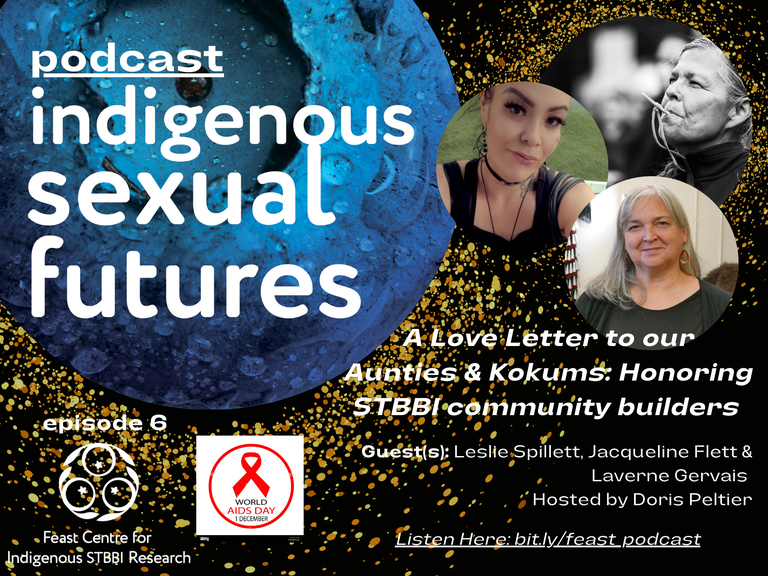
Episode 5 Sharing Gifts with the People: Reflections on Cultural Healing
In Episode 5, Doris invites Feast Centre Elders Wayne Seward (Snuneymuxw) and Catherine Martin (Mi'kmaw) to the table to talk about cultural healing and how each brings their gifts to the people. From speaking about the importance of cedar brushing, to acknowledging the four medicines, to acknowledging 'laughter' as the fifth medicine in our healing, these two Elders use the power of storytelling, mixed with a little bit of humor here and there, to speak about what they bring to community. You will not want to miss this episode! As we always do, this podcast will also feature a song from each Elder, songs that they were given permission to share with the people.
]
Episode 4: My Grandmother Said "Leave Some For the Birds"
Indigenous Sexual Futures Episode 4 features Marjorie Beaucage.
In Episode 4, Doris invites Métis Elder Marjorie Beaucage to be featured as a special guest to talk about her 'hot off the press' published book titled, leave some for the birds - Movements for Justice. In this podcast storytelling episode, we hear in her own words about the movements in her life that culminated in the writing of her poetic memoir that highlights seven decades of living and seeking justice as a Two Spirit Métis woman who still retains her Michif language. Additionally, as part of celebrating Indigenous History Month and PRIDE Month, Marjorie is a beautiful fit for this special episode . Marjorie is an acclaimed filmmaker, art-ivist and educator, land protector and a water protector. Born in Vassar, Manitoba, to a large Métis family, Marjorie’s life’s work has been about creating social change, working to give people the tools for creating possibilities and right relations. She is a beloved Feast Centre Elder and a soul-filling storyteller!
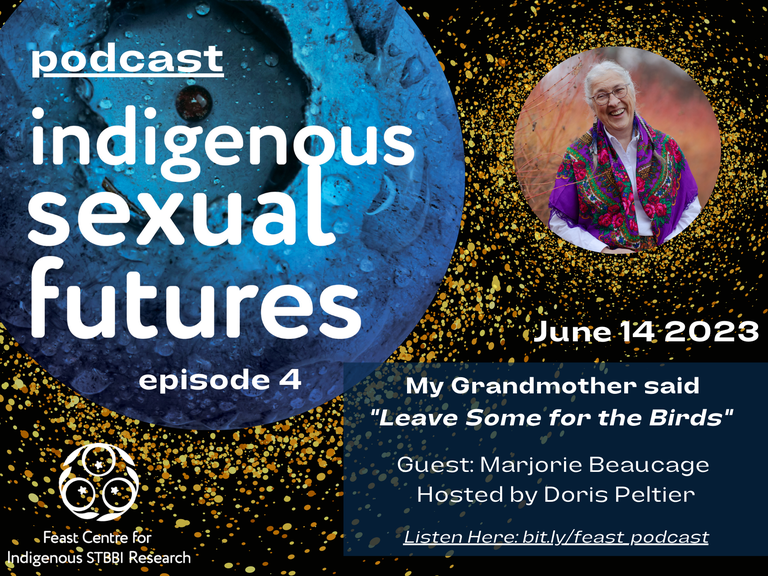
Episode 3: E-inigoowa'ikawaag oowi aki, abi-izhinoowa'amawishin
Indigenous Sexual Futures Episode 3 features Gayle Pruden. Hosted by Doris Peltier.
In Episode Three, Doris invites Gayle Pruden for a very special storytelling session. Gayle is known and loved by many Indigenous people across Turtle Island, the diversity of the communities that love Gayle is vast, from the Two-Spirit community across Turtle Island to the Jingle Dress dancer community to the Grandmother (Kokum) community in her circles. Her storytelling focuses on her traditional upbringing by her great-grandfather and her grandparents who raised her. She says they imparted love to her in her upbringing and it is love that continues to carry into her present life, it is an embodiment of how she was raised. She says her great-grandfather and grandparents did not experience residential school and spoke their Anishinaabe language fluently and according to Gayle, their traditional knowledges were strong. Notably, in listening to her story about her great-grandfather and grandparents, what they passed on to Gayle was embodied culture and tradition which the Elders lived, we do not see too much of this anymore in today's contemporary Indigenous world. Interspersed with Anishinaabemowin, Gayle tells her story with poignancy, wonder, beauty and of course with her unique and infectious Anishinaabe humor. She is a woman of indomitable spirit for the future and a gifted storyteller.
Episode 2: "Sexual Health is Part of My Medicine Bundle"
In Episode Two, Doris speaks with Martin Morberg and Lane Bonertz, two phenomenal leaders who work with the Two-Spirit Program at the Community Based Research Centre (CBRC). They share the creation and developmental story of the Medicine Bundle, an innovative, culturally informed and culturally grounded HIV prevention tool geared towards Two-Spirit, Queer, and Trans Indigenous community members. When the HIV self-testing kit became widely available in Canada, the Two-Spirit leadership at the CBRC saw an opportunity to harness culture and tradition for HIV self-testing for the two-spirit community in BC. Martin and Lane also acknowledged the commitment of the CBRC who worked with local Two-Spirit leaders to establish the Two-Spirit Program within their organization. The CBRC recognized that "true reconciliation requires more than an endorsement and have made a series of commitments" to community, utilizing the Calls to Action from the TRC (https://www.cbrc.net/2spirit-program). Listen to our Podcast starting April 12, 2023!
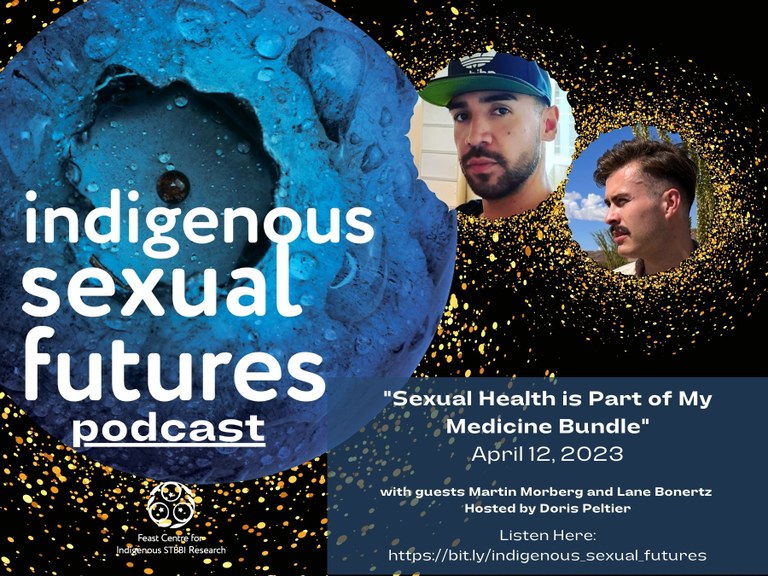
Episode 1: Setting the Indigenous Sexual Futures Table
On January 25th we will be launching Episode 1 of the Indigenous Futures Podcast, Setting the Indigenous Sexual Futures Table.
In Episode One, Doris speaks with Randy Jackson and Grace Dillion about how Indigenous Futurisms is integral to Indigenous sexual futures. Indigenous Sexual Futures is a term coined by the Feast Centre that delineates a vision for tomorrow’s grandchildren that is sexually expansive, healthy, and safe. We consider Indigenous futurisms as foundational to the work we do at the Feast Centre for Indigenous STBBI Research moving forward. In the last decade, the Indigenous research community has embedded strengths-based approaches and are already leading the way into the future by prioritizing Indigenous ways of knowing and being in how we conduct research. The Anishinaabe word ‘biskaabiiyang’ is an Anishinaabe concept of ‘returning to ourselves’ and is now widely used as a replacement word for decolonizing the tremendously important work of Indigenous Futurisms. As a fluent Anishinaabe speaker, this word has a deep resonance for Doris, and she hopes it resonates for all of you listeners too. Kwa’Nu’Te, sung by Elder Catherine Martin. Intro/Extro spoken Anishinaabe word by Elder Gayle Pruden.
